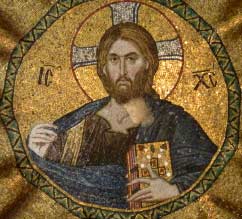|
But does He indeed 'transfer' anything, and where is the reference to "the Father"?
They understand Him to have said, 'I'm not good,' and will sometimes
directly so 'quote:' "'When a man called him "good," he said that he
is not good, only God is good.'" (quoted in Nabeel Qureshi, Seeking Allah,
Finding Jesus, p. 90). Unitarian Theodore Parker is sure that's what he
heard: "Even Jesus bids you not call him good; no man has all the
manhood of mankind." (Theodore Parker, Works of Theodore Parker,
Kindle location 5741). But did Jesus actually say
that?
Do not overlook in reading this passage that Jesus is
asking a question. It is sometimes assumed there is no good
answer to the Lord's question, that the expected response is not a defense but an apology:
'I'm sorry, I shouldn't have called you "good," my mistake.' But is
there really any reason to think that is the correct answer to the
question? It is not even the Muslim answer, because Muslims believe
the prophets are 'good;' and Jesus was "without sin"
(Hebrews 4:15). "The young ruler was probably sincere and not using mere fulsome compliment, but Jesus challenges him to
define his attitude towards him as was proper. Did he mean "good" ([agatos]) in the absolute sense as applied to
God?" (Robertson Word Pictures). Did he indeed? Jesus frequently asked His followers Who they thought He was:
"When Jesus came into the region of Caesarea Philippi, He asked His disciples, saying, 'Who do men say that I, the
Son of Man, am?' So they said, 'Some say John the Baptist, some Elijah, and others Jeremiah or one of the prophets.' He said to them, 'But
who do you say that I am?' Simon Peter answered and said, 'You are the Christ, the Son of the living God.' Jesus answered and said to
him, 'Blessed are you, Simon Bar-Jonah, for flesh and blood has not revealed this to you, but My Father who is in heaven.'"
(Matthew 16:13-17).
He did not ask these questions because He did not know who He was and needed
their insight. Rather, this is a question every human being must face: Who is Jesus?
"The ruler using the inconsiderate, conventional
language of the thoughtless, had taken an unwarrantable freedom with
the word 'good.' Jesus shows that if his language had been used
sincerely it would have committed him to a declaration of great
faith, for he had addressed Jesus by a title which belongs only to
God, and he had asked Jesus the question concerning that of which
God alone was fitted to speak. As the ruler had not used this
language sincerely Jesus challenged his words." (J. W. McGarvey, The
FourFold Gospel, Kindle location 8424).
The Lord's questions could be gnomic and puzzling: "While the
Pharisees were gathered together, Jesus asked them, saying, 'What do
you think about the Christ? Whose Son is He?' They said to Him, 'The
Son of David.' He said to them, 'How then does David in the Spirit
call Him "Lord," saying: "The LORD said to my Lord, Sit at My right
hand, Till I make Your enemies Your footstool"? If David then calls
Him "Lord," how is He his Son?' And no one was able to answer Him a
word, nor from that day on did anyone dare question Him anymore."
(Matthew 22:42-45).
We do know that Jesus asked questions, not to learn an unknown answer
but to put the questioned party on record: "And this he said to
prove him: for he himself knew what he would do." (John 6:6). Instead
of assuming the correct answer to the question, "Why do you call Me good?" should be, 'Oops, I made a mistake',
the reader should leave open the possibility that the correct answer, the answer the Lord sought, may be, 'I call
You good because I know who You are: You are the living God'.
Psalm 118 begins, "Oh, give thanks to the Lord, for He is good!"
Augustine's exposition explains,
"The praise of God could not be expressed in fewer words than these, "For He is good." I see not what can be more solemn than this brevity, since goodness is so peculiarly the quality of God, that the Son of God Himself when addressed by some one as "Good Master," by one, namely, who beholding His flesh, and comprehending not the fulness of His divine nature, considered Him as man only, replied, "Why callest thou Me good? There is none good but one, that is, God." And what is this but to say, If thou wishest to call Me good, recognise Me as God?"
(Augustine, Saint. The Complete Works of Saint Augustine:
Expositions on the Book Of Psalms, ... (50 Books With Active
Table of Contents) (Kindle Locations 86077-86081)).

|




